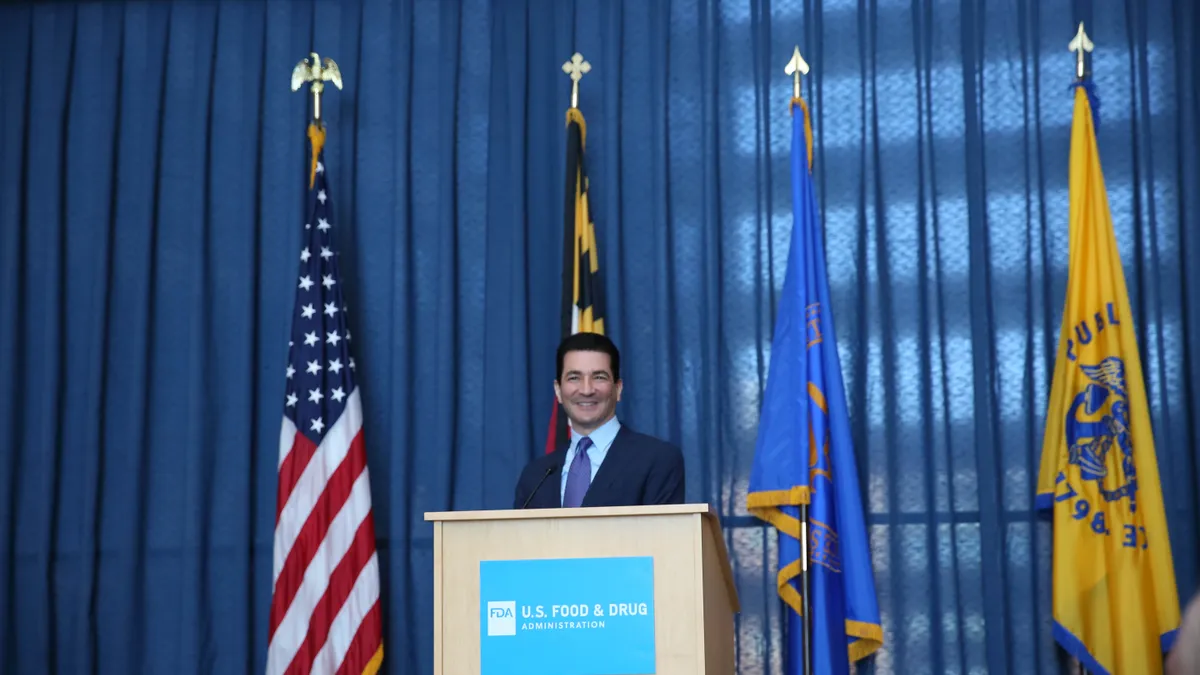Dive Brief:
-
FDA Commissioner Scott Gottlieb rocked the health policy world Tuesday with news that he will be resigning in a month. But despite Gottlieb's broad popularity among industry, lawmakers and public health professionals, FDA's medtech efforts will likely proceed unabated when he leaves the agency.
-
Center for Devices and Radiological Health Director Jeff Shuren, who has served at FDA for over 20 years in various roles, will maintain continuity in the agency's medical device oversight efforts and initiatives, experts tell MedTech Dive.
-
Principal Deputy Commissioner Amy Abernethy, who recently joined the agency from Roche unit Flatiron Health to help develop the agency's approach to real-world data, is rumored as a potential acting commissioner, which could be good news for those hoping for stability at CDRH.
Dive Insight:
Under Gottlieb's tenure FDA rolled out a number of medical device initiatives, some mandated by the landmark 21st Century Cures Act, such as guidances on breakthrough devices, CLIA waiver improvements and least burdensome device review.
Other policies, such as the agency's proposal to examine limiting manufacturer reliance on 510(k) predicate devices older than 10 years came in the midst of criticism the agency is too lax in its regulatory oversight.
But Gottlieb often left device decision making to Shuren, a sign he trusted the career staffer to run the show.
"At CDRH, really what he was doing was letting Jeff Shuren do his thing. It was Jeff driving it and Gottlieb giving him permission to do so," Brad Thompson, a digital software attorney at Epstein Becker & Green, told MedTech Dive. "I don't mean to minimize that. There are some commissioners who would have said no, just saying yes to Shuren was significant."
But Gottlieb was not hands off either. He regularly jointly announced medtech initiatives with Shuren including efforts to stand up a Pre-Cert Program for software as a medical device, which "at least created the impression that Dr. Gottlieb was very involved and proactive" in the device space, according to Jeffrey Shapiro, a device attorney at Hyman, Phelps & McNamara.
"I didn't see an initiative from the device center that it hadn't been working on to some extent in the last few years," Shapiro said. "I don't see a big change unless the new commissioner somehow has a different set of priorities or ideas about device regulation."
President of the National Center for Health Research Diana Zuckerman agreed, telling MedTech Dive the true impact of Gottlieb's exit on the device center will depend on if his replacement "will continue to let Jeff Shuren run the show or want to make changes."
It's unclear who will take Gottlieb's place, but some in industry fear a less conventional, more typical Trump administration candidate. During the last FDA chief search, the rumored nomination of Peter Thiel associate Jim O’Neill, who advocated against mandating companies prove the effectiveness of new products, spooked some.
Bakul Patel, FDA associate center director for digital health, is another CDRH leader who shepherded the Pre-Cert Program from conception to its current proposal. His presence will maintain additional normalcy at CDRH, according to Thompson.
The agency is in the process of collecting feedback on the latest working model for the Pre-Cert Program, which has drawn fire from Democrats and some in industry for potentially overstepping FDA's statutory authority.
Gottlieb and Shuren also worked together to stand up the National Evaluation System for health Technology (NEST), a real world evidence collection initiative tied to a postmarket surveillance push denoted in the Medical Device Safety Action Plan.
Transparency via social media may also take a hit with exit of Gottlieb, widely considered an effective communicator for FDA with his robust presence on Twitter. Twitter-less Shuren has kept a relatively low public profile compared to the commissioner.
"The most immediate change at FDA will no doubt be a radical slow-down in the news flow. Gottlieb is a genius at offering a constant stream of newsy updates, packaging almost any FDA guidance or workshop into a larger more gripping narrative," Cowen Washington Research Group's Rick Weissenstein said in a note. "In the absence of the constant, agency-directed messaging, those outside groups could start to reshape the narrative."
Shuren, who has served as director of CDRH since 2010, has been the source of many of the center's novel ideas over the past decade. For example, he recently co-authored a JAMA Viewpoint article advocating continuing to leverage RWE.
"We anticipate that decentralized network models, such as PCORnet and NEST, although still in their infancy, will emerge as appropriate models to harness the breadth of electronic data generated in health systems," Shuren jointly wrote.
Abernethy, if appointed, will likely be supportive of the effort, according to Thompson.
Another potential downside for FDA will be a lack of a cheerleader to Congress. Senate HELP Committee Chairman Lamar Alexander, R-Tenn., praised Gottlieb's time at the agency, noting he has worked closely with Congress and implemented Cures provisions aimed at bringing more medical devices to market faster. Rebecca Wood, who served as FDA chief counsel under Gottlieb, echoed the sentiment to MedTech Dive.
Gottlieb secured a nearly $50 million boost in appropriations for a spate of device and radiological health programs FDA recently received in the February package.
"He was one of the most politically astute commissioners. He knew how to get Congress on his side much more successfully than most FDA commissioners are able to do," Zuckerman added. "It's really actually unlikely that his successor will be as good at that."












